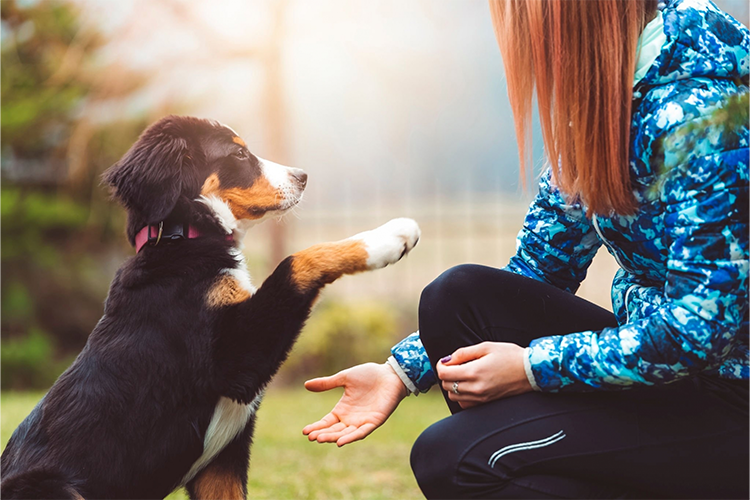Elevate Your Skills with Local Dog Training Charlotte Programs
Elevate Your Skills with Local Dog Training Charlotte Programs
Blog Article
Unlock Your Dog's Prospective: Proven Pet Training Methods for Success
Reliable pet training is a nuanced process that hinges on understanding canine behavior and utilizing clinically backed methods. By including favorable reinforcement, establishing clear commands, and prioritizing socialization, pet proprietors can grow an effective partnership with their family pets.
Comprehending Canine Behavior
Understanding canine habits is vital for reliable training and fostering a favorable partnership in between canines and their proprietors. A detailed grasp of canine body movement, vocalizations, and social communications is essential for acknowledging their emotions and needs. Dogs interact mostly through non-verbal signs; for example, a wagging tail may show enjoyment, while pinned ears can signify fear or entry.

Moreover, ecological variables play a considerable function in shaping a pet's actions. Changes in regular, new surroundings, or the existence of unfamiliar people can cause stress or anxiousness in dogs. Acknowledging these triggers allows owners to alleviate negative responses and establish ideal training approaches.
Eventually, a deep understanding of canine habits lays the structure for successful training techniques, boosting both behavior and the overall bond in between the canine and its proprietor. dog training charlotte nc. This knowledge is crucial for fostering a well-adjusted, pleased canine buddy
Favorable Reinforcement Strategies
Reliable training depends heavily on favorable reinforcement techniques, which have been shown to yield significant lead to forming wanted habits in pet dogs. This strategy involves compensating a canine for displaying particular behaviors, therefore raising the probability that these behaviors will certainly be duplicated. Incentives can take numerous types, consisting of deals with, appreciation, playthings, or playtime, depending on what motivates the specific pet.

It is important to slowly terminate rewards as the pet discovers the habits, transitioning to periodic support. This approach maintains the habits over time while avoiding dependence on continuous incentives. By concentrating on favorable reinforcement, fitness instructors can cultivate a relying on connection with their pet dogs, promoting a cooperative and healthy training atmosphere that enhances overall obedience and performance.
Establishing Regular Commands
A fundamental element of effective pet dog training is the establishment of consistent commands. Uniformity in commands is vital for reliable communication in between the fitness instructor and the dog. When commands are consistent, dogs learn to connect details words with wanted behaviors, which accelerates the training procedure and improves understanding.
To establish constant commands, it is vital that all member of the family make use of the very same terminology and motions. For example, visit here if a single person uses "sit" while one more states "rest down," it can create confusion for the dog. Select clear, distinctive words for commands and make certain everybody involved in the dog's training sticks to these selections.
Enhance commands with constant practice, making sure that the canine gets ample chances to react appropriately. When a pet effectively follows a command, prompt positive reinforcement should adhere to.
Last but not least, hold your horses. Developing consistent commands requires time and initiative. With dedication and clearness, you will help your pet create a solid understanding of expectations, eventually causing a well-behaved companion.
Socialization and Exposure
Socializing a canine is necessary for fostering a well-adjusted and confident buddy. This process entails exposing your pet to a variety of environments, people, and other animals to develop their social abilities and flexibility. Early socialization, ideally in between the ages of 3 to fourteen weeks, is crucial, as it lays the groundwork for a canine's future habits.
Throughout socialization, purpose to offer favorable experiences in different settings, such as parks, active streets, and homes with other pet dogs. Present your pet to different stimulations, including noises, views, and scents, making certain that each encounter is rewarding. This exposure assists mitigate concern and anxiety, leading the way for a more resistant pet dog.
Participating in controlled group play sessions with other pets can likewise boost social abilities, showing your pet ideal interactions and borders. Always monitor your dog's convenience level during these experiences, slowly boosting exposure as their confidence grows. Bear in mind, the objective is to produce a well-shaped pet that grows in varied scenarios, advertising an unified relationship with both human beings and various other animals. Prioritizing socialization will substantially browse around this web-site add to your canine's total happiness and behavior throughout their life.
Conquering Common Educating Obstacles

Pet dogs might struggle to focus in active or unfamiliar settings. Gradually desensitize your pet dog to disturbances by beginning training in a peaceful environment and slowly introducing even more stimuli as they become efficient.
In addition, behavioral concerns like jumping or excessive barking can come to be frustrating. Address these by educating alternate actions, such as resting calmly when greeting guests. Consistency and persistence are important; strengthen wanted habits regularly and avoid abuse, which can cause complication.
Last but not least, acknowledge that each pet is distinct, and training timelines may differ. Tailor your approach to your canine's individual needs, and seek specialist advice if required. With perseverance and the right methods, getting over these obstacles can lead to a well-trained, delighted canine companion.
Conclusion
In final thought, unlocking a canine's potential necessitates a thorough strategy that integrates an understanding of canine actions, the application of favorable reinforcement strategies, and the facility of consistent commands. Early socializing and exposure to varied settings even more enhance a pet's flexibility and self-confidence. By dealing with usual training obstacles with customized methods and persistence, a unified and cooperative partnership between pet and trainer can be cultivated, ultimately resulting in a mannerly companion qualified of growing in numerous scenarios.
Effective pet dog training is a nuanced procedure informative post that pivots on recognizing canine actions and employing medically backed methods.Comprehending pet dog habits is vital for effective training and promoting a positive connection in between pet dogs and their owners.Effective training relies heavily on positive reinforcement strategies, which have actually been shown to yield significant outcomes in forming wanted habits in pets. When commands are uniform, pets discover to associate specific words with desired behaviors, which accelerates the training process and enhances understanding.
In verdict, opening a canine's prospective necessitates a comprehensive technique that incorporates an understanding of canine habits, the application of positive support strategies, and the facility of regular commands.
Report this page